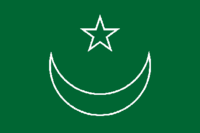| Daughters of the Nation | |
|---|---|
| Dukhtaran-e-Millat | |
 | |
| Also known as | Daughters of the Faith |
| Leader | Asiya Andrabi |
| Dates of operation | 1993 – present |
| Motives | Imposition of Islamic law in Kashmir, secession of Jammu and Kashmir from India |
| Active regions | Jammu and Kashmir |
| Ideology | Islamism Jihadism Separatism |
| Political position | Far-right |
| Status | Active designated as a terrorist organisation by: |
Dukhtaran-e-Millat (transl. Daughters of the Nation; abbreviated as DeM) is an all-women outfit that advocates for jihad to establish Islamic law in Kashmir and for the secession of Jammu and Kashmir from India.[1] It is a front organisation of the Hizbul Mujahideen, a jihadist militant group.[2][3]
The group was founded in 1987, and is headed by Asiya Andrabi, an "Islamic feminist".[4] During the Kashmir militancy in the early 1990s, the group issued threats to women not wearing a face veil and burqa, some of whom became victims of acid attacks.[5]
The Government of India designated it a terrorist organisation and banned it in 2018. [6]
References[edit]
- ^ Dukhtaran-e-Millat. satp.org
- ^ Behera, Navnita Chadha (2006), Demystifying Kashmir, Washington, D.C.: Brookings Institution Press, p. 154, ISBN 978-0-8157-0860-5
- ^ Swami, Praveen (13 March 1999). "The revival of communalism". Frontline, The Hindu. Retrieved 31 March 2023.
- ^ An Islamic Feminist: Asiya Andrabi and the Dukhtaran-e-Millat of Kashmir Archived 3 December 2013 at the Wayback Machine Francesca Marino, Journal of South Asia Women Studies, Vol. 12 Nº. 1 (3 December 2010)
- ^ Schofield, Victoria (2003) [2000], Kashmir in Conflict, London and New York: I. B. Taurus & Co, pp. 173–174, ISBN 978-1860648984
- ^ "List of Banned Organisations". Ministry of Home Affairs, GoI. Government of India. Archived from the original on 3 May 2018. Retrieved 3 May 2018.
Well, that’s interesting to know that Psilotum nudum are known as whisk ferns. Psilotum nudum is the commoner species of the two. While the P. flaccidum is a rare species and is found in the tropical islands. Both the species are usually epiphytic in habit and grow upon tree ferns. These species may also be terrestrial and grow in humus or in the crevices of the rocks.
View the detailed Guide of Psilotum nudum: Detailed Study Of Psilotum Nudum (Whisk Fern), Classification, Anatomy, Reproduction